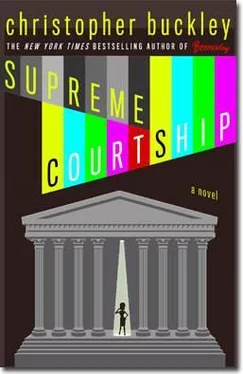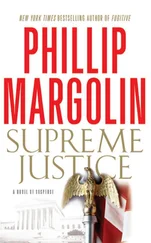“Be that as it may. It’s my job, Dexter.”
“With all the dire things going on in the world right now… the economic situation, Texas about to mine its border with Mexico, these Russian submarines snooping off our shores like great white sharks, TV judges on the Supreme Court… and you’re all bent out of shape because a U.S. senator wants to lift the image of the entire government and maybe make a little walking-around money on the side…”
“I’m tired of this conversation, Dex. The rules say no outside regular salary. And that’s that. Over and out.”
“It’s not a salary.”
Cranch slammed his fist on his desk. “Then what in tar hell is it? And don’t you tell me it’s an honorarium. We get into more pissin’ matches over that goddamned word honorarium.”
Dexter stood before a window, looking at his presidential-yes-reflection. He sighed philosophically.
“It’s sad,” he said. “You devote your entire life to public service… your whole life… and an opportunity comes along to do something good for your family, a little money-”
“I thought the money was going to your war chest.”
“I consider my family part of my war chest, Clem. And the next thing you know you’re being trampled into the ground by the Four Horseman of the Ethicalypse. No wonder young people don’t want to go into politics these days.”
“That was a fine oration. Up there with Cicero. You done?”
“Will you walk with me, Clem? Will you take a few steps with me?”
Senator Cranch sighed. “Dammit, Dex, it ain’t up to just me.”
“This could be good for all of us. A sitting senator on a popular prime-time TV show, dynamically playing President of the United States.”
“Hold on. Hold on. How did you wantin’ to play Mr. Hollywood President become a mission of mercy on behalf of the U.S. Senate?”
“Have you seen the latest polls? Do you know what percent of the American people have quote-unquote high confidence in the Senate?”
Cranch groaned.
“Twelve percent,” Dexter said. “Twelve percent. Donald Vanderdamp-who has brought incompetence and dishonor to the office of the President-he has better numbers than us.”
“If it comes to that,” Clem said, “I don’t have a whole lot of quote-unquote confidence in the American people. But we’re stuck with each other. As for Don Veto, I wouldn’t worry none about his popularity ratings. Maybe he got a little temporary uptick from the Cartwright thing, but he’s a long way from winning any beauty contests. Hell, the Presidential Term Limit Amendment just got voted out of committee. Bussy Filbrick says it’s gonna sail through the House faster than shit through a goose. According to my whip count, it’s got over sixty-eight votes in the Senate. [18]Personally, I wish I could vote for it twice. That self-righteous cocksucker just vetoed my shrimp boat building initiative in Pascagoula.”
Dexter said, “What good is denying him a second term? From what I hear, he doesn’t even want a second term.”
“How’d you like to go down in history as the president who caused a constititutional amendment keeping presidents from having more than one term? I’d call that a serious humiliation, far as a legacy goes.”
“Wouldn’t it be simpler just to impeach him?” Dexter said.
“Be simpler,” Cranch said, “to shoot the sumbitch. But they got laws, so they tell me.” The two men stared at each other.
“I didn’t say that,” Cranch said. “Looky here, Dex, I’d like to help. I sure would. I love you like my brother.”
“You don’t have a brother, Clem.”
“Well, if I did, I’d try to love him like I do you. But I can’t just go creating a loophole the size of the Grand Canyon for you. They’d run me outta here faster than a nukular particle accelerator. Sorry, old buddy, but you’re gonna have to choose between the U.S. Senate and this TV show.”
JUST A FEW BLOCKS AWAY at the marble palace, everyone was being very nice. Pepper had been bracing for wrinkled brows and sneers of cold command from her fellow justices. They practically greeted her with sugar donuts and hot chocolate. Paige Plympton, apparently a fan of Courtroom Six, gave her a little hug. Paige was an unflinty Maine Yankee; former Chief Judge of the State Supreme Court. Her ancestors had come over on the second boat to land after the Mayflower. “We sent the servants on ahead.”
Only two handshakes from her new peers were on the cool side: Justices Santamaria’s and Richter’s.
Pepper suspected that Silvio might feel a little awkward inasmuch as he’d given an interview after her nomination was announced calling it “another installment in the Great Dumbing-Down.” She’d been tempted to bring along a thirty-six-ounce bottle of Mountain Dew and a bag of pork rinds. Paige had advised against it.
Ruth “Ruthless” Richter wasn’t outright hostile, but her vibes were of the what-are-you-doing-here kind. But then she, like CJ Hardwether, was going through a rough patch as a result of a vote. Ruth had written for the majority in al-Muktar v. United States, the ruling that freed “suspected terrorist”-as he was then called by the media-Sheik Mohammed al-Muktar from the U.S. military prison in Guantánamo. Two months later, Sheik al-Muktar graduated to “confirmed terrorist” after blowing himself up on a parking lot shuttle bus at Disney World along with twenty-three visitors to the Magic Kingdom.
Justice Richter stood by her opinion on constitutional grounds, but her approval ratings were now such that she had to be moved about town in an armored personnel carrier with helicopter gunships patrolling overhead. So she was understandably a bit on edge these days. One morning while the justices were in conference, a law clerk passing outside dropped a volume of U.S. Reports onto the floor of the marble corridor, causing a bang. Ruth dove under the table.
Ishiguro “Mike” Haro was the first Japanese-American Supreme Court justice, and persuasive evidence that Asians really are intellectually superior to the other races. His hobby was doing the Times of London crossword while blindfolded. He’d graduated from Stanford Law School at age twenty. By twenty-four he was a Silicon Valley billionaire start-up lawyer; at twenty-eight, the youngest judge on the federal bench (Ninth Circuit). He was, like many of advanced intelligence, impatient with those of more modest brilliance. He was not shy of expressing deeply held opinions, such as that President Truman was-as he put it, perhaps unwisely within view of someone’s cell-phone video camera-“a runty genocidal haberdasher” for having dropped the A-bomb on some of his relatives. He was not overly popular with the law clerks-even his own-who made puns on his surname’s similarity to an Asian mispronunciation of “hello.”
Justice Morris “Mo” Gotbaum had been, until joining the Court, senior senator from New York. He was a famously soft touch when it came to staying executions, having granted seventy-eight stays so far. This caused tensions between him and Silvio, an ardent champion of the ultimate sanction. Silvio kept a little guillotine cigar-cutter on his desk-for the amusement of visiting children (he claimed). Mo never missed an opportunity to tweak him. Once during oral argument in a case involving a public school teacher who had been fired for expressing a favorable opinion about Intelligent Design, Mo had asked the teacher’s attorney, “If Intelligent Design exists, how would you explain the U.S. Tax Code?”
In other ways, Mo was atypical for a New York Jewish liberal. His great passion in life was putting on black leather and touring the country on a Suzuki Rocket motorcycle-he privately called it his Crotch Rocket-with his wife, Bella, hanging on behind for dear life. He faithfully attended the annual biker rally in Sturgis, South Dakota, every year and gave passionate, well-footnoted speeches to the bikers, calling for a motorcycle exception from the national speed limit. When bored during oral arguments, which he frequently was, he would hum “Born to Be Wild.”
Читать дальше











